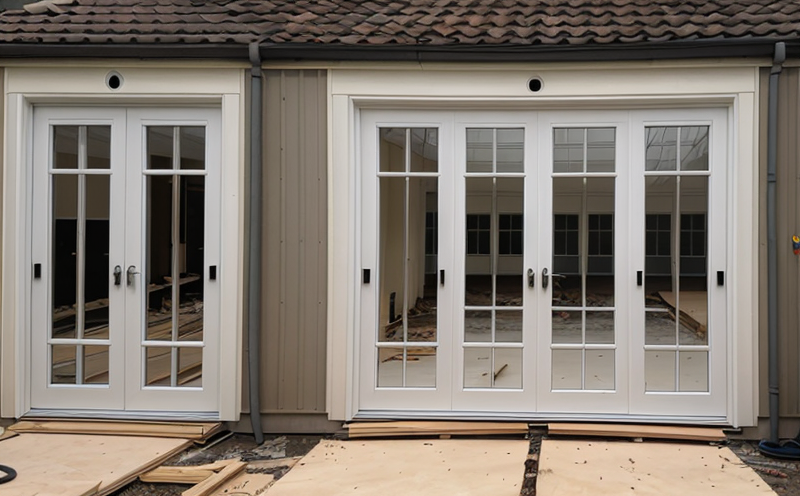Integrity and Insulation Testing for Doors under Fire
In fire safety testing, doors play a critical role in preventing the spread of flames and smoke. Integrity and insulation tests ensure that doors maintain their structural integrity and insulative properties during a simulated fire scenario. This test is crucial as it helps to determine how well a door can withstand high temperatures, resist flame penetration, and prevent the passage of heat and smoke.
Testing involves subjecting full-size or representative samples of doors to controlled conditions that mimic real-world fire scenarios. The standard procedure typically includes exposing the specimens to a standardized fire source for a specified duration while monitoring various parameters such as temperature rise, flame penetration, and structural stability.
The integrity test aims to evaluate how well the door resists the passage of flames and hot gases under fire conditions. This is achieved by measuring the maximum flame length that can pass through the door opening without exceeding pre-defined limits. The insulation test focuses on assessing the thermal resistance provided by the door, ensuring it maintains a safe temperature gradient between two sides.
During the testing process, doors are subjected to intense heat and flames for a set period. Simultaneously, thermocouples and other sensors measure internal temperatures at strategic locations within the door assembly. These measurements help determine whether the door can maintain its structural integrity and insulative properties during the fire.
Testing laboratories like Eurolab follow stringent protocols to ensure accurate results. Specimens are prepared according to specific guidelines, ensuring that they accurately represent real-world conditions. The testing apparatus used includes furnaces capable of generating controlled heat and flame environments suitable for simulating fires in various settings.
The results from these tests provide valuable insights into the performance of doors under fire conditions. Compliance with relevant standards ensures that buildings are safer and more secure, reducing risks to occupants during emergencies. Eurolab’s expertise in this area allows it to offer comprehensive testing services tailored to meet the needs of clients across different sectors.
| Standard | Description |
|---|---|
| EN 16320:2015 | Fire resistance tests for doors and other opening elements in buildings. |
| ASTM E907-18 | Standard test methods for determining the flame spread rating of protective coatings on building materials using a tunnel apparatus. |
| BS 476-23:2015 | Fire tests on building materials and products – Part 23: Fire resistance tests for doors, shutters, fire dampers, grilles and other similar components. |
The data obtained from these rigorous tests is crucial in ensuring that doors meet stringent safety requirements. By adhering to international standards such as those mentioned above, Eurolab ensures that its clients receive reliable and accurate test results. These results are essential for manufacturers, architects, and building owners who need to comply with local regulations while enhancing the overall fire safety of structures.
Understanding the importance of integrity and insulation testing is vital for anyone involved in the design, manufacturing, or inspection of doors used in buildings subjected to fire hazards. By investing in thorough testing, stakeholders can significantly improve the safety measures within their facilities, thereby protecting lives and property.
Why It Matters
The integrity and insulation testing for doors under fire conditions is essential because it ensures that these critical components perform their intended functions during emergencies. Doors are often the first line of defense against the spread of fire, smoke, and toxic gases in buildings. Properly tested doors can help maintain structural stability, prevent flame penetration, and sustain a safe temperature gradient between different areas of the building.
When fires occur, time is critical, and doors must hold firm to buy precious minutes for evacuation or firefighting efforts. Doors that fail these tests are not only non-compliant but also pose significant risks to occupants and responders alike. Therefore, conducting thorough integrity and insulation testing helps identify potential weaknesses early on, allowing manufacturers and designers to address them before products reach the market.
Compliance with relevant standards is mandatory in many regions, making it imperative for facilities to undergo these tests regularly. Non-compliant doors can lead to severe penalties, including fines or even legal action, depending on local regulations. Furthermore, using tested and certified products instills confidence among stakeholders regarding the reliability of fire safety measures.
Ultimately, integrity and insulation testing contributes significantly towards creating safer environments by ensuring that doors meet specific performance criteria. Such rigorous assessments not only uphold industry standards but also contribute to public health and safety at large.
Frequently Asked Questions
Eurolab Advantages
At Eurolab, we pride ourselves on delivering exceptional integrity and insulation testing services for doors under fire conditions. Our team of experts utilizes cutting-edge technology and adheres strictly to international standards, ensuring accurate and reliable results every time.
We offer a range of complementary services designed to support your facility’s ongoing compliance efforts. From initial consultation to final report issuance, our dedicated staff is committed to providing personalized attention and guidance tailored specifically for your project needs.
By choosing Eurolab, you gain access to unparalleled expertise and resources that can help enhance the safety of your buildings. Our commitment to excellence ensures that you receive top-notch services delivered efficiently and cost-effectively.





